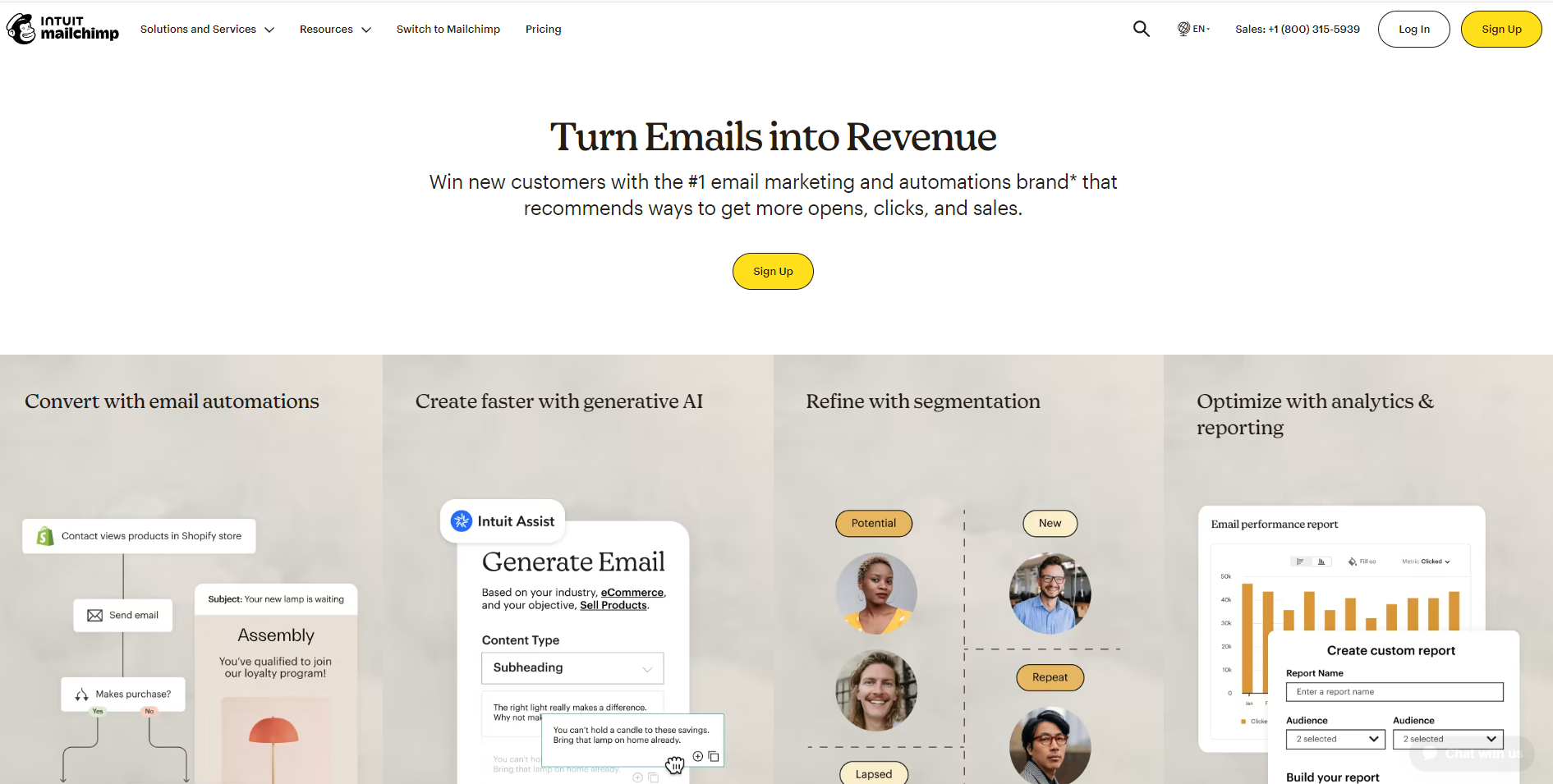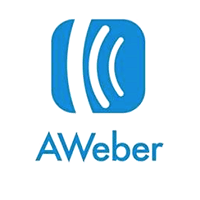Klaviyo is a popular email marketing platform used by over 100,000 online businesses to design email campaigns, collect customer data, segment contacts, and track results. While it offers robust features for e-commerce companies, online brands do eventually outgrow Klaviyo or find themselves needing different functionality not offered by the platform.
There are a few key reasons why companies consider moving from Klaviyo to an alternative email service provider, such as insufficient segmentation options to cater to a growing contact database, no native integrations with key e-commerce platforms like Shopify, etc. If this tool hasn’t met your needs, consider these Klayivo alternatives.
Brevo
If you want the best all-in-one email marketing platform & the best Klaviyo alternative, Brevo is for you.
Omnisend
Omnisend is the ideal choice if you're eCommerce focused and need a reliable and efficient email marketing tool.
HubSpot
HubSpot is perfect for scaling businesses, boasting some powerful and easy-to-use marketing tools.
ActiveCampaign
ActiveCampaign is an ideal choice if you're looking to integrate the tool with other customer channels.
AWeber
AWeber is one of the easiest-to-use email marketing tools, helping you execute efficient email campaigns quickly.
1. Brevo
Best Overall Klaviyo Alternative (Free, then $25/Month)
Brevo is a delivery-centric email marketing platform built to help e-commerce brands and online retailers increase the reach of their marketing campaigns. Its core features include detailed deliverability metrics, advanced list cleaning and verification tools, granular reporting on email engagement, and AI optimization to improve open and click-through rates.
Brevo also provides high-volume sending capabilities, accommodating over 5 million emails per month at its lowest pricing tier. The platform makes it easy to design responsive email templates as well as set up automation for cart abandonment, welcome sequences, and rule-based messages tailored to customer behaviors.
What Makes Brevo a Better Alternative Than Klaviyo:
- Specializes in maximizing email deliverability through proprietary verification technology and built-in list cleaning
- Offers more affordable pricing for sending high volumes per month
- Provides optimization recommendations to continually improve campaign performance
- Integrates delivery data with customer profiles for targeted behavioral messaging
- A simpler interface compared to Klaviyo allows faster template building and campaign creation
By focusing specifically on guaranteed email delivery and insights to refine that delivery, Brevo suits e-commerce companies that struggled with improving their sender reputation, inbox placement, or deliverability metrics using Klaviyo. The platform’s affordability, automation capabilities, and purpose-built tools provide a more reliable way to get marketing emails in front of customers.
2. Omnisend
Best for Shopify Merchants Prioritizing Email and SMS Integration (Free, then $16/Month)
Omnisend is an email and SMS marketing platform built exclusively for Shopify stores. It seamlessly integrates customer data from Shopify to trigger personalized messaging across multiple channels.
Key features include powerful automation based on customer lifecycle and product interactions, AI-generated product recommendations in emails, SMS campaign creation, and unified reporting on all communication through their dashboard.
What Makes Omnisend a Better Alternative Than Klaviyo for Shopify Stores:
- Deep integration with Shopify data and event triggers lacking in Klaviyo
- Automated post-purchase review requests and next-cart recovery opportunities
- Dynamic product recommendations tailored to individuals’ browsing behaviors
- SMS messaging expands reach beyond email subscribers only
- All customer data and messaging history stays within one unified platform
For Shopify brands struggling to connect customer data into their Klaviyo account or leverage its automation effectively, Omnisend provides a purpose-built alternative to solving those e-commerce pain points. The unified SMS and email capabilities also help retailers reach customers however they prefer to engage.
3. HubSpot
Best for Scaling Agencies or Product Companies (Free, then $20/Month)
HubSpot is an all-in-one marketing, sales, and CRM platform with powerful email capabilities suitable for high-volume senders with complex needs. It offers data-driven automation, drag-and-drop email editor, templates, workflows, and advanced analytics.
HubSpot also provides easy integration across its suite of tools including landing pages, forms, and CRM data—everything connects into one ecosystem designed for inbound marketing and selling. Granular segmentation options help personalize messaging to contacts based on attributes and engagement data.
What makes HubSpot a better alternative than Klaviyo:
- More robust segmentation and automation based on CRM-level data
- Expanded functionality beyond just email like landing page creation
- Sales-focused analytics on engagement impact on the customer journey
- Education and certifications included with the software
- Powerful mobile optimization for emails and forms
For growing product companies, media publishers, or agencies struggling with multiple tools and complex data in Klaviyo, HubSpot delivers an all-in-one growth stack connecting communications to conversions. The CRM additions and educational resources also set brands up for long-term success in managing and retaining customers.
4. ActiveCampaign
Best for Integrating Email With Other Customer Channels ($29/Month)
ActiveCampaign is an email marketing automation platform focused on integrating communication channels like email, SMS, social media, live chat, and messaging apps. This allows for unified, trackable messaging whether via marketing content or sales outreach.
Core features include 500+ native integrations with popular apps, AI-powered automation based on contact activity across channels, sophisticated segmentation and list management tools, and easy-to-use templates and designs for crafting email content.
What makes ActiveCampaign a better alternative than Klaviyo:
- Deeper support for multiple communication channels beyond just email
- Pre-built automation connecting email to live chat, SMS, and messaging apps
- Advanced segmentation by contact engagement across all integrated platforms
- More affordable and transparent pricing model
- Higher deliverability rates across industries
For digital brands relying heavily on channels beyond just email in Klaviyo for sales and support, ActiveCampaign delivers the capabilities to unify those channels for maximizing engagement. The improved deliverability and competitive pricing also make it very appealing versus purely email-focused options.
5. AWeber
Best For SMBs Focused on Simplicity and Ease of Use (Free, then $12.50/Month)
AWeber is an easy-to-use email marketing platform catering to solopreneurs, small businesses, bloggers, and early-stage startups. It focuses on streamlined automation, template and design flexibility, and simplified list management in an intuitive interface.
Key AWeber features include pre-designed sign-up forms, drag-and-drop email builders, segmentation tools requiring no coding skills, and integration with many common platforms ecommerce businesses use. The platform also provides excellent deliverability and compliance safeguards for new email marketers.
What makes AWeber a better alternative than Klaviyo:
- Extremely simple interface and navigation, easy for novices
- Built-in sign-up forms and list integrations for beginners
- Affordable pricing plans for SMBs starting in email
- High inbox placement rates for new accounts
- Superior 24/7 customer support comes standard
Solopreneurs and early-stage startups who felt overwhelmed with advanced functionality or managing multiple integrations in Klaviyo can thrive with AWeber’s purpose-built simplicity for small email programs. The educational resources and compliant infrastructure also ensure the right foundation.
6. MailerLite
Best for Creators and Solopreneurs Focused on Design (Free, then $10/Month)
MailerLite is an intuitive, design-driven email marketing platform built for bloggers, artists, entrepreneurs, and small teams creating content or direct mailing campaigns. It provides beautiful, creative templates and an easy drag-and-drop builder to craft engaging emails quickly.
The platform also includes pop-up sign-up forms, basic automation workflows, contact management tools, and integration with major landing page builders, CRMs, and e-commerce platforms used by individuals just starting. Competitive free and paid plans make MailerLite accessible for early-stage solopreneurs.
What makes MailerLite a better alternative than Klaviyo
- Gorgeous templates and designs ideal for visually compelling emails
- Easy-to-use editor and automation tailored to beginners
- Generous free account option with up to 1,000 subscribers
- Seamless integration with WordPress sites and newsletters
- Solid deliverability rates for freelance creators and solopreneurs
For independent creatives struggling to build beautiful, engaging emails within Klaviyo’s less intuitive interface and constraints, MailerLite delivers the tools better suited for that audience’s needs in terms of simplicity, design quality, and budget considerations. It’s the best option compared to many other email marketing tools.
7. Campaigner
Best for Highly Personalized Behavioral Email Messaging ($59/Month)
Campaigner is an email marketing and automation solution focusing on dynamic content personalization. Key features include AI-powered behavioral triggers, infinite segmentation combinations for custom messaging, drag-and-drop content builders with dynamic fields, and granular reporting on content performance.
The platform also provides automated workflows connecting major e-commerce platforms, deep analytics on buyer journeys, and a suite of list management tools for maintaining clean, up-to-date subscriber data compliant with regulations in the US, EU, and CAN-SPAM policies.
What makes Campaigner a better alternative than Klaviyo:
- Next-level personalization capabilities with dynamic content
- Highly advanced subscriber and campaign analytics
- Complex automation and segmentation without coding
- Specialized deliverability tools for regulated industries
- User permissions and CRM integrations ideal for teams
For rapidly growing e-commerce brands, the constraints around Klaviyo’s level of email customization, integrations, and targeting eventually surface. Campaigner provides the advanced tools to push personalization for your online business to the next level in driving repeat purchases and loyalty – essential for further scaling the business.
8. BigMailer
Best for High Volume Transactional and Promotional Email (Free, then $5/Month)
BigMailer is an enterprise-grade email marketing platform built for major retailers, large e-commerce sites, and fast-growing DTC brands sending high volumes of both promotional and transactional messages.
It provides powerful deliverability guarantees, unlimited contacts and emails per month, drag-and-drop editors for rapid creation at scale, granular analytics, and robust segmentation tools for personalization. Marketing automation features connect data from all major e-commerce platforms and CRMs.
What makes BigMailer a better alternative than Klaviyo:
- Unlimited contacts, emails, and templates for true enterprise-scale
- Volume discounts for accounts sending 10M+ emails monthly
- Superior deliverability through dedicated IP addresses
- Built-in compliance adherence checks before sending
- Connects data across multiple platforms into one ecosystem
Once brands exceed Klaviyo’s volume limits for contacts, emails, and automation complexity, BigMailer’s email marketing service delivers the enterprise-grade power to scale while optimizing relevant reach to millions of contacts with personalized cross-channel messaging that drives growth.
9. Constant Contact
Best for Simple Email Marketing for Small Businesses (Free Trial, then $12/Month)
Constant Contact is an approachable email marketing solution built for small businesses, nonprofits, schools, churches, and local organizations needing an easy way to create professional-looking newsletters.
It provides logo and template design services, integrated e-commerce promo code creation, event promotion templates, and marketing advice from email experts. Contact segmentation options and basic automation make it accessible for customizing basic emails like welcome series and announcements.
What makes Constant Contact better than Klaviyo
- Extremely simple email editor and template designs
- Affordable pricing for very small lists
- Built-in logos, flyers, and promo graphics
- Excellent educational guides and 24/7 customer support
- Reliable inbox placement for US-based small business IPs
The learning curve for leveraging advanced features in this email marketing tool eventually frustrates small business owners trying to promote their company or connect with local customers. Constant Contact delivers an easy-to-start email marketing solution perfect for Schools, Churches, and Salons – no expertise required.
10. GetResponse
Best for Growing Email List Building and Management (Free, then $15.60/Month)
GetResponse is an email marketing and automation solution tailored to building an engaged email subscriber base, whether through signup forms, landing pages, pop-ups, website widgets, or integrated webinars.
It provides intuitive creation tools for beginners including hundreds of professionally designed templates, a drag-and-drop editor, contact tagging for basic segmentation, and basic automation for welcome series and announcements. More advanced users can utilize the platform’s superior deliverability, compliance adherence, and automation connecting integrations.
What makes GetResponse a better alternative than Klaviyo
- Seamless email list building right within the platform
- Superior deliverability and compliance standards
- Webinar integration is ideal for lead nurturing
- Generous plans for mid-market customer base sizing
- Good support and educational resources included
When Klaviyo users outgrow available compliance or deliverability capabilities yet don’t require advanced enterprise-level functionality, GetResponse strikes an ideal balance in features, resources, and pricing for mid-market and growth-phase companies focused on expanding their subscriber base.
11. Benchmark Email
Best for Highly Customizable and Scalable Email (Free Plan, then $13/Month)
Benchmark Email is an enterprise-level email marketing platform providing unmatched customization flexibility combined with robust segmentation tools, automation, and deliverability infrastructure.
It caters to mid-market and growth companies needing to scale email capabilities faster than allowed on entry-level or less feature-rich platforms. Custom branding, CSS editing, and HTML templating give complete control.
What makes Benchmark Email better than Klaviyo:
- Extremely customizable email builder and templating
- More scalable segmentation and automation
- Dedicated IP allocation guarantees inbox delivery
- Superior analytics and real-time reporting
- Affordable growth-focused pricing plans
Once e-commerce brands outgrow the constraints around customizable design, complex segmentation, workflow personalization, and analytics within Klaviyo’s interface and infrastructure, Benchmark Email provides the ideal blend of enterprise-level functionality with mid-market accessibility to scale email marketing that converts visitors into loyal customers.
12. Mailchimp
Best for Beginner Email Marketers Focused on Simplicity (Free, then $10/month)

Mailchimp is one of the world’s most popular email marketing platforms catering to growing small businesses. It’s loved for its straightforward drag-and-drop builder, intuitive automation, excellent educational resources, and expansive integrations with common small business tools.
Flexible pricing plans make it affordable as lists grow from a few hundred to the millions. Mailchimp also provides exceptional customer support, high-volume sending capabilities, and built-in designs for beautiful emails.
What makes Mailchimp better than Klaviyo:
- Simplified interface and navigation ideal for novices
- Educational courses and guides included for all users
- Affordable pricing even at higher tiers
- Expansive library of plug-ins and integrations
- Excellent compliance and deliverability reputation
For solopreneurs or early-stage e-commerce brands who found Klaviyo overwhelming to navigate or lacking in available support, Mailchimp shines as the leader in intuitive email marketing tailored for growing a business from scratch. The education and community resources ensure accessible success.
1. Ease of Use
Ease of use is critical when evaluating alternatives to Klaviyo because the platform is often initially chosen for its relatively intuitive interface compared to some enterprise options. However, once brands scale, more complex functionality is needed.
The new platform should ideally marry strong feature sets with simplicity so marketers can create campaigns and leverage data without requiring extensive specialized training or coding skills.
Things to consider around ease of use include how intuitive the platform is to navigate from both desktop and mobile. Evaluate how much time and effort is required to create basic email templates and workflows.
Confirm if the platform offers drag-and-drop builders requiring no coding. Review how responsive the customer support team is across multiple access channels. Check how extensive training materials, courses, or community resources are offered.
Selecting an alternative email provider with complexity surpassing current team capabilities can negatively impact productivity and engagement. Prioritizing solutions with both depth and accessibility sets brands up for self-sufficient success.
2. Design and Customization
Design and customization capabilities are vital to evaluate when selecting a new email marketing platform, as creating a consistently on-brand experience across messages ensures professionalism and engagement.
Consider how much control and flexibility you need around tailoring emails to match websites, advertising creatives, product packaging, and other touchpoints.
Customization functionalities like using your own HTML and CSS, editing templates, incorporating dynamic content, designing for mobile optimization, A/B testing components, and building multi-step journeys should be assessed.
Think through what design resources, integrations, workflows and skill sets your current marketing team has to determine an ideal level of creative freedom vs pre-designed simplicity from a platform.
Prioritizing email provider solutions matching your resources and customization needs avoids the added costs of outsourcing design needs your business later exceeds. Selecting options with scalable templates as you grow can also prevent rework down the line. Determine what design control and capabilities align with your brand’s growth trajectory.
3. Blogging Tools
Assessing the blogging capabilities offered natively in email marketing platforms is key for brands focused on content creation and inbound marketing strategies. Determine if you want an all-in-one solution with built-in blogging that connects subscriber engagement data to your posts and offers templates for lead capture.
Alternatively, some providers integrate seamlessly with popular blogging platforms like WordPress instead while still allowing you to monitor the ROI of blog content driving email signups. Consider whether your team plans to frequently publish blogs natively from an email tool or simply embed pre-written posts from a site.
Evaluate the learning curve, customization options, SEO optimization capabilities, and overall usability of blogging functionalities across new platforms. Ensure capabilities align not just for your current blog content and cadence but for future content expansion plans as your inbound strategy evolves.
Selecting alternative solutions with blogging tools matching long-term inbound objectives as well as current resources avoids costly platform switching down the line as that strategy scales up.
4. E-commerce Capabilities
Robust e-commerce capabilities should be strongly assessed when selecting a new email marketing provider, especially for DTC brands or retailers where email generates a material percentage of revenue.
Consider functionality around mapping customer journeys post-purchase, automating reorder or repurchase messaging based on past buying habits, integrating campaign metrics with financial data, and personalizing product recommendations.
Evaluate how intuitively an alternative solution captures and leverages order, cart, and product browse data to inform highly targeted, dynamic email content. Segmentation agility to create groups like power buyers, returning customers, or at-risk churners is equally important to personalize the experience.
Prioritizing platforms with deep, scalable e-commerce features tailored to your business model and customer journey mapping ensures that transitioning tools won’t negatively impact sales derived from email engagements. Seek solutions that help you maximize the lifetime value of existing contacts through personalized post-purchase touchpoints.
5. SEO Tools
Evaluating the native SEO capabilities offered in email marketing platforms is essential for companies focused on discoverability, organic traffic, and leveraging email to supplement inbound strategies.
When assessing alternatives, determine SEO needs around optimizing and indexing signup forms and landing pages for keyword searches, integrating email performance data with other site analytics, and utilizing emails to brand build around topics driving interest and links.
Functionality around crafting shareable content within newsletters that users organically spread and link to also impacts organic discovery. Similarly, confirms how alt text, metadata, and other optimizations are handled in platform design.
Choose alternative solutions evolved enough to facilitate email-driving SEO efforts now and in the future as authority-building and organic contribution rise strategically. Email software lacking SEO consideration often cannot scale.
6. Integrations
Assessing the native and third-party integrations offered by email marketing platforms is critical for seamless transitions between tools and maximizing stack connectedness.
When switching from Klaviyo, determine must-have integrations like e-commerce platforms, CRM or databases, chat and help desk apps, mobile notifications and SMS channels, landing page builders, payment systems, or webinar software leveraged currently.
Ideally, the alternative solution either natively supports or offers a compatible plug-in to connect those vital tools for unified data and usability between systems.
The ability to track customer journeys and messaging engagement flowing between apps prevents data silos. Carefully evaluate if an alternative provider can properly integrate the necessary stack tech based on the business model, use cases, and workflows. They should match Klaviyo’s breadth at a minimum for a viable transition that maintains workflows.
Assess if their API connectivity also allows room to scale app connections as needs evolve over the next few years as your company grows. Having an ecosystem constrained to just essential integrations now can hurt agility later if you outgrow capabilities quickly due to changing needs.
7. Analytics and Reporting
Comparing the analytics and reporting functionality embedded within email marketing platforms is hugely important when assessing alternatives aligned to data insights needs.
Specifically evaluate depth on engagement metrics (opens, clicks, dwell time), campaign performance trends, multi-variate testing abilities, customer journey mapping, lifetime value or predictive modeling, and segmentation analysis. Look for customization around building real-time customizable reports and dashboards for visibility needed across teams from executives to frontline marketers.
Consider if the platform alternative mirrors Klaviyo’s analytics strengths today that provide meaningful insights that inform strategy and personalization. The new solution should prove scalable through more advanced automation, integrations, and machine learning outputs as data needs grow beyond entry-level offerings.lhv
Having reporting limitations that inhibit an evolving understanding of email’s impact on loyalty and conversion results hurts strategy development and execution needed to continually optimize for metrics that impact revenue. Seek alternative solutions with analytics capabilities as data-centric as internal analytics appetites demand both now and years out as your subscribers scale up.
8. Customer Support and Community
Vetting the caliber of customer support and the breadth of educational resources offered is critical when assessing email marketing alternatives aligned to user skill levels. For less technical teams, determine if multi-channel assistance options spanning self-help content to chat, email, phone, and even virtual training are available, ideally 24/7.
Consider ease of accessing and using help resources when issues surface across platforms from desktops to mobile apps.
Evaluate the presence of vibrant user communities to connect with power users leveraging the platform similarly. This provides social Q&A troubleshooting and inspiration from shared use cases. Ideal community forums are well-moderated, searchable by topic, and segmented by industry to ensure relevancy.
Ideally support capabilities not just resolve platform issues and questions reactively but help guide successful strategy development proactively over time based on stage. Seek customer-centric alternatives providing reliable, personalized guidance fueling user capability building through guided learning journeys, whether through an account manager or intelligent recommendation engine.
9. Pricing
Comparing pricing models and actual costs is imperative when assessing email marketing platform alternatives aligned to current budgets and growth trajectories. Be transparent about the true spending of existing contracts, including add-ons or overage fees that inflate costs over time, to understand baseline costs.
Estimate email volume, subscription projections, and feature needs 2-3 years out with realistic growth baked in across low, moderate, and aggressive projections.
Vet each platform’s pricing page thoroughly, including fine print on custom quotes for enterprise needs, to determine true comparison costs. Calculate the total cost of ownership based on your use case against contract term flexibility, scaling costs as volume increases, and hidden fees that surprise billpayers.
Ideally the alternative aligns affordably to current resources and expected growth needs without huge cost leaps forcing complex procurement. Platforms requiring unexpected enterprise upsell requirements introduce financial risk and platform uncertainty down the line likely requiring another transition.
10. Reviews and Reputation
Vetting customer feedback and the overall industry reputation of email marketing platforms is equally important when transitioning from a familiar solution like Klaviyo to lesser-known options. Look beyond a homepage’s claims around deliverability expertise, ease of use promises, or award logos that may be purely marketing rhetoric.
Seek out authenticated reviews on trusted software review sites to surface unbiased user experiences from diverse industries and company stages using that platform’s full capabilities.
Evaluate areas like suitability for growing email volumes, changing segmentation needs, cross-channel connection issues, or poor technical support referenced commonly among impartial reviewers. Also check if community chatter in forums or Reddit echoes sales points made or mostly uncovers issues transitioning from other platforms, either initially or in scaling.
Carefully review published compliance report cards and audit trailing issues over recent years for any transparency concerns around deliverability or security standards adherence eroding performance behind the scenes long term.
Favorably reputed solutions earn loyalty through consistent, aligned performance evolving with customers’ growing business needs – critical for relying on them long term as key revenue infrastructure.
Summary and Top Picks
When brands outgrow Klaviyo’s capabilities or find gaps that emerge better filled by specialized email marketing platforms, identifying the right alternative aligned to current and future needs is vital for scaling successfully.
This guide covered key considerations around ease of use, customization and design, blogging abilities, e-commerce feature sets, SEO tools, vital integrations, analytics depth, customer support, pricing models, and industry reputation when seeking a solution to transition to.
Aligning needs across those evaluation criteria and mapping alternative provider strengths accordingly ensures your expanding business won’t be constrained by the move. The right platform choice based on stage, channel mix, budget, and team skill sets can unlock more impactful campaigns, better subscriber experiences, and valuable automation powering loyalty.
The table below shows my top five Klaviyo alternatives based on common scenario needs and the platforms strongest aligned to those use cases:
Brevo
If you want the best all-in-one email marketing platform & the best Klaviyo alternative, Brevo is for you.
Omnisend
Omnisend is the ideal choice if you're eCommerce focused and need a reliable and efficient email marketing tool.
HubSpot
HubSpot is perfect for scaling businesses, boasting some powerful and easy-to-use marketing tools.
ActiveCampaign
ActiveCampaign is an ideal choice if you're looking to integrate the tool with other customer channels.
AWeber
AWeber is one of the easiest-to-use email marketing tools, helping you execute efficient email campaigns quickly.





